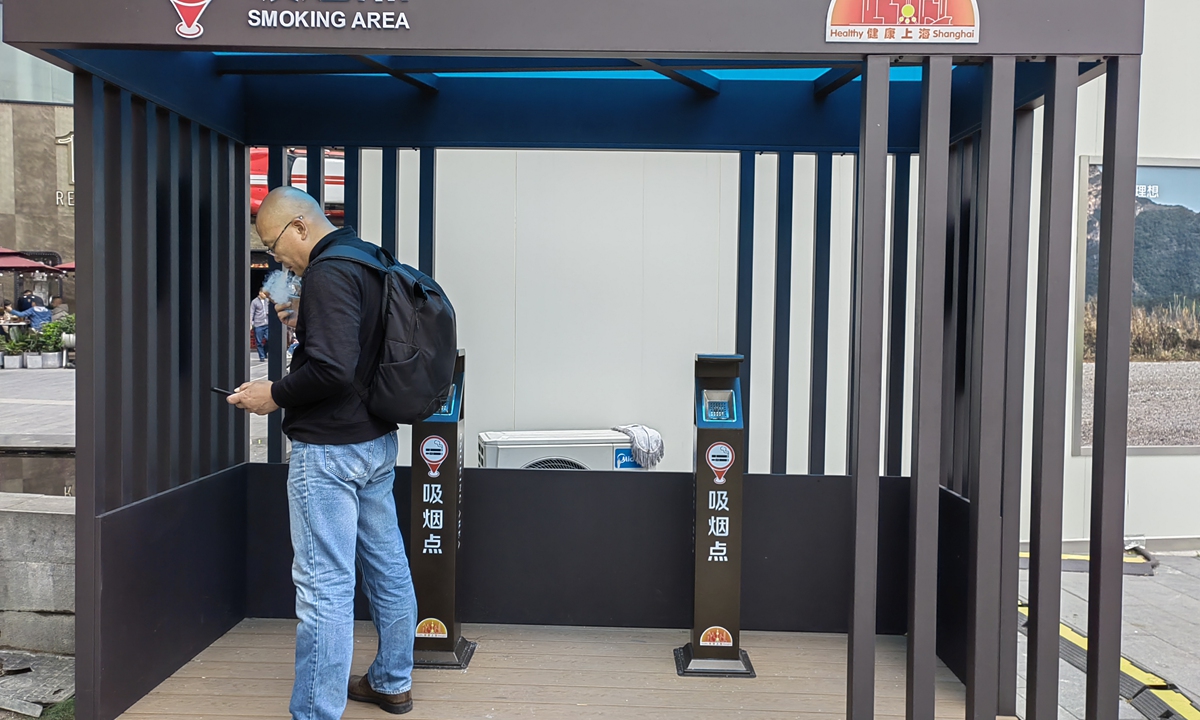
One of the first 100 "demonstration outdoor smoking areas" in Shanghai was put into use on a plaza outside a shopping mall in Qibao town, Minhang district in Shanghai on April 5, 2023. Photo: IC
Shanghai has taken the lead in implementing outdoor "wandering smoking" control measures at eight major tourist landmarks. The initiative has received thumbs up from netizens, who have suggested expanding the effort nationwide.
Starting in mid-March 2025, Shanghai first put in place an outdoor "wandering smoking" control at eight popular landmark tourist attractions frequented by both domestic and international tourists, including Wukang Road, Xintiandi, the Bund, Nanjing Road pedestrian street, and the Lujiazui area, The Paper reported on Sunday.
"Wandering smoke" refers to drifting street cigarette smoke produced by smokers who smoke while walking (or cycling) outdoors, a form of secondhand smoke, Chen De, vice president of Shanghai Smoking Control Association, told the Global Times on Sunday.
On China's social media platform Sina Weibo, the initiative received wide support, with some netizens suggesting a nationwide rollout.
One netizen commented that "I support Shanghai's efforts as a flagship city of China with this initiative." Another netizen suggested including Shanghai Disney Resort into the list of pilot venues since most of its visitors are children and "wandering smoke" is serious in queuing lines.
Chen said the eight landmarks adopts site-specific strategies combining education, enforcement, and joint management by venue operators and local businesses to create a smoke-free environment.
Take century-old stone-gate block reborn as The INLET cultural hub, a shopping and cultural complex featuring Shanghai's unique shikumen, or stone-gate houses as an example. No-smoking signs have been placed at the main entrance and near the subway exits, display boards and television screens have been set up to promote awareness of the guidelines, and ashtrays placed by merchants in outdoor areas have been removed.
Meanwhile, with property security personnel's and smokings control volunteers' patrols and a comprehensive and around-the-clock regulatory network has been established, according to The Paper.
According to Chen, outdoor secondhand smoke control efforts currently focus on awareness and consensus, not mandatory prohibitions.
Venue management authorities are required to install no-smoking signs and designated outdoor smoking areas as needed, strengthen inspections, and train staff and volunteers to guide and discourage smoking behavior.
Businesses in these areas are focusing on awareness and guidance by posting no-smoking signs in outdoor queues and seating zones, using digital screens to promote smoking control, and having staff actively steer smokers away from prohibited zones, Chen said.
According to Chen, Shanghai's adult smoking rate has dropped to 19.2 percent, but the exposure rate to secondhand smoke remains as high as 47.6 percent, highlighting persistent issues with outdoor smoke.
A citywide survey found nearly 60 percent of residents frequently encounter "wandering smoke," and over 90 percent residents express their dislike for it. The general public believes that "wandering smoke" not only harms others' health but also poses safety risks, affects the city's appearance, and disrupts the travel experience, according to The Paper.
The top spots for "wandering smoke" are outdoor queues, sidewalks, amusement parks, bus stops, and entrances to malls and office buildings.
As tourism in Shanghai grows, both domestic and international visitors have reported the widespread occurrence of outdoor smoking.
According to Chen, overseas countries and regions such as Japan, South Korea, Singapore and Hong Kong and Macao special administrative regions have implemented statutory non-smoking in densely outdoor populated venues. Tourists from these places often report being unaccustomed to the drifting cigarette smoke found on Shanghai's streets.
Jiang Yuan, former director of the Tobacco Control Office under the Chinese Center for Disease Control and Prevention (Chinese CDC), said the ongoing smoking bans in Hong Kong and Macao have led to broad social consensus. In Hong Kong, citizens are prohibited from smoking or carrying lit cigarettes, cigars, or pipes in outdoor public elevators, escalators, schools, wetland parks, public beaches, and bus stops, with violators facing a fixed fine of HK$1,500 ($192). In Macao, smoking is banned within a 10-meter radius of bus stops and taxi stands, with a maximum fine of 1,500 Macao pataca ($187) for smoking in public places and a fine of 600 Macao pataca for littering cigarette butts, China Central Television reported.
According to the Healthy China 2030 blueprint, efforts must be made to comprehensively promote compliance with smoking control, intensify smoking control measures, and enhance the effectiveness of smoking control through methods such as pricing, taxation, and legal measures.




